In a few weeks or months, we will be living in a post virus America. My rooftop view of a post virus America is coming into view. Will America be different from the one we have known? What are the shifts taking place that will realign the American experience to a new compass point? Is it realistic to think we can simply go back to the way things were in the pre-virus America?
While we do not know precisely what a post virus America will be and how the landmarks will shift, we sense the tremors and the shifting of the foundations that provided stability and a sense of security.
In my mind, the America we have known is now in the rearview mirror. Significant changes are underway, and they are not all bad, necessarily. Here are 8 changes I see coming to a post virus America.
1. Government with New Powers and More Debt
Governments thrive on crisis, war being the most notable and exploitable crisis of all. To many politicians, their value improves when they exploit an emergency, and few politicians there are who will not take full advantage of the exploitive opportunities inherent in every crisis
In ways, the virus has exposed government thirst for more power, debt, unbridled scope of control.
At first, it all seemed innocuous. As the virus rolled into state, counties, and cities, fear gripped us all. The genuine need to protect ourselves became a part of our confusion and apprehension. Enter government.
On the local level, mayors and governors began to assess and calculate how they might control a potential public panic. Authorities armed with daily briefings from Washington, demanded all Americans shelter in place. Suddenly, proclamations were issued by mayors and governors to shut down restaurants, churches, and all other significant gathering places where the virus might spread. Americans, wanting to comply and be reasonable, rolled over. Now, there is growing regret with our compliance.
From the White House press room emerged the daily briefings, protracted seminars about the science of epidemiology and pandemics. We gathered around our T.V.s to listen and learn. Suddenly, the federal government was managing the nation’s health, a task formerly the sole responsibility of the states.
We watched a big government transformed into the procurement office for state hospitals, taking responsibility to provide ventilators, beds, testing equipment, personal protection equipment (“PPE”), beds, pop-up hospitals, and even the Navy’s floating hospitals.
Then came the financial subsidies of people and businesses that were wrecked by the same government that would now “guarantee” the suffering would be limited. We are now at version 3.5 of the rounds of funding generated by Congress. Checks and electronic deposits were guaranteed. Many have not seen a dime.
In all of this, the government has discovered and secured new powers, backed by its faulty usurpation of authority. It’s a power established, not by law, but by the mere precedent of having got away with it.
Government powers are solidified by its to seize it, create debt, and promise Americans they will be cared for from Washington, DC. Taking control during a crisis is the new political value proposition.
My rooftop view of a post virus America is showing me a government that has grabbed more power than ever before. The power is fueled predictably by the creation of money that doesn’t exist.
2. Social Behavior Modifications
From my perch, I see major social and behavioral modifications. Some good. Mostly bad. There has been a staggering growth of social angst. The nervous tensions are electric.
We’re afraid of contact, of what others might do to us. Will the masked man in the grocery store give me COVID-19? Should I even be in the grocery store? Is being there allowed? Why are people wearing masks? I no longer recognize my neighbors.
This virus, and our response to it, has created general anxiety, hesitation, distance (“social distancing”). It seems as if we’ve gone from floating through life to stutter-stepping through it. Intimacy, on the whole, is experiencing a downward spiral. Getting close is a no-no and, in some cases, illegal, subject to arrest, fines, and even imprisonment.
The notion of brushing shoulders could shortly be illegal behavior, perhaps criminal behavior!
My point should be clear. Staying away and estranged in the social environment is fast becoming the demanded norm. We aren’t shaking hands, hugging, kissing, or even shoulder bumping. It’s wrong because the government said so. The state has told us such behavior is a precursor to disease and even death.
We are called on to accept and even to demand social distancing; for ourselves, for everyone, everywhere, all the time. Of course, we are repeatedly told that all government requirements are in our best interest. These behavioral requirements are the new normal at home, work, and all social interactions, and they will redefine interactions and social intimacy that previously defined our once beautiful culture.
Employers, now liable for employees with the virus, are implementing new workplace entrance requirements. My daughter has her temperature taken at Chick-fil-a before assuming her duties. From my rooftop view, I see a workforce of masked people subjected to a whole new slate of health requirements to keep their jobs.
When it comes to the workplace, sweeping changes will be enacted. Every workplace in America is now a liability zone for both employees and employers. Tomorrow’s employees will likely be required to wear masks. Upon arrival, and prior to entry, your temperature will be taken. Government posters will encourage you to identify employees who exhibit “symptoms.” Suddenly, a virus-free work environment will be a government-guaranteed human, even universal right. Imagine trying to function in this kind of work environment.
By means of new federal, state, county, and local regulations, employers will be threatened with shut down for non-compliance with health department edicts. Washing of one’s hands could be federally mandated. Workplace hand sanitizer will be prevalent, even required. There will be no handshaking, no close proximity, and everyone everywhere will be on edge, suspicious, and filled with angst.
I also see disruptions and modifications of social interactions in entertainment and sports venues. Sporting events, concerts, yes, even Trump rallies will be transformed into who knows what? Visiting the local library or attending a concert or movie theaters will evolve into a monstrous affair that ultimately we will replace with digital solutions. The question I’m making is simply one. What toll will these transformations take on America?
Then too, we will see a transformation of education environments. Already, high school and college graduations have been modified or altogether terminated. Kindergarten boys and girls will never again line-up to go to lunch or recess. There will be no recess! Sitting on the floor in a circle for reading time will be a violation of the social distancing edicts.
The virus means school is out. From top-to-bottom, kindergarten through high school, and into community colleges, trade schools, and state colleges and universities, the virus produced a dispersion all its own. We’re scattering.
Community colleges, trade schools, state colleges, and universities have closed or suspend, and quickly adapt to virtual education. Large universities suddenly lost their grip on students, causing us to ask, “Tell me again why this cost so much money?” and “What do we need this huge campus, after all?” and “It looks like we don’t need this much overhead.”
Shut schools have become the norm. Without consulting parents, governors decided the school year needed to end. Amazingly, the order to close schools came after telling us young people weren’t at risk. Kids were sent home to empty houses. Many parents were still working. Then, of course, the next question was, how would all of these children eat without government meals supplied by government schools?
Suddenly, families are looking at caring for one another and educating their children without the aid of a surrogate nanny institution. Of course, this was nothing new to homeschoolers, families, who, long before the virus, jettisoned the public and private schools in favor of teaching at home.
We’ve discovered, or I should say, we’ve been told with some evidence, that there are dangers inherent in our concentrated urban lifestyles. We’ve known for some time that stacking and packing millions of people into urban centers, while a profit principle for real estate developers, is a breeding ground for pandemics.
Freedom of Religion? Well, maybe! Government, working through arrogant governors, is telling Americans they can’t gather to worship God. Violators have been arrested and fined.
How and why we congregate to celebrate our beliefs is an inalienable constitutional right, endowed by the very Creator we meet to revere. Assembly, for any lawful purpose, is also a legal right. But politicians are telling us that they, armed with a virus, can redefine this right.
The notion of government overseeing religious assembly, if accepted, will be the crowning blow to religious freedom. If the government must approve a right, that right is no longer inalienable.
COVID-19 is an entirely new value proposition top to bottom, redefining our interactions.
My view from the rooftop is showing me that these modifications of social behavior will change us, assuredly.
3. The Emergence of New Media
The virus has wrecked the traditional media. Pre-virus trust was already in the toilet. The media outlets sent their top anchors home to broadcast from their bedrooms, dens, home office, even garages, and balconies. Seeing these legends out from under the studio lights and backdrop, without makeup and impeccably groomed hair, made them almost seem real. Weren’t they always real? No.
Studios were always props. Newsrooms have been the platforms for designing productions, a show, and a stage for storytelling.
All of a sudden many of us are wondering why were ever needed the media. We didn’t. We just thought we did.
Before the virus, the costal, big-city media outlets and their purveyors became more distrusted than ever. Their narcissistic, self-induced destructive behaviors, and blatant lies have caught up to them. We simply don’t believe them. They wholly lack credibility, and they are brutish, self-serving charlatans weaving stories so biased it’s obvious.
With the virus, Americans have a new view from the rooftop. We don’t need the “regular” media anymore. After all, we have each other! Communication channels, including social media, podcasting, and creative networking around shared interests, have erased the need for the pros. Mostly without studios, curvy couches, and “sets,” we talk to each other every day, almost without censor, certainly without makeup!
Even politicians are opting out of traditional media. Empowered with new tools like teleconference town halls, small conference call groupings, and topical recitations of policy positions via Skype, etc., politicians can talk to one or several-thousand people without a media filter. Zoom, Go-to-Meeting, and other similar sources are affordable tools of media disintermediation.
The virus has hurt the media but helped America communicate in new ways. Yes, there are bias, censorship, and control problems with social media outlets like Twiter, Facebook, and Instagram. Still, all-in-all, the citizen communication networks are exploding, without help from CNN, MSNBC, and the rest.
Post virus, when all is said and done, we are the media. There remains little-to-no trust in the ethical standards of journalism. We will take matters into our own hands…we have to, who else will?
That’s my view of the emergence and redefining of how media will work in a post virus America.
4. Economic and Consumer Behavior Transformation
In my view, from the rooftop, I see a transformation of both the economy and a huge leap forward in consumer buying behaviors.
With 26 million people out of work, the economy will not be the same for a long time. Reversing this reality will take decades. As a result of the multiple Coronavirus stimulus packages, many people are making more money by staying at home and not working than they earn by being employed. For some, going back to work will be difficult.
Reviving stagnate businesses riddled with new operating requirements and a new set of liabilities will be daunting for many small business owners. For some, it will be the end, sadly.
Our burgeoning national deficit means that each person in the United States currently owns about $100,000 of the total national debt. Worse, even openly declared GOP Congressmen are not discussing a solution to deficit spending. The topic has been abandoned, appearing only in fine print in the party platform.
Debt is no longer a topic of even the staunchest conservatives. We’re giving up on the notion of living within our means. Let’s add to this the precedent of funding Americans through tough times. Using the virus, Washington, D.C. has established a new nanny-state pattern that says during hard times we’re going to print money, devalue the dollar, and welfare our way through the crisis.
America is broke, afloat on a sea of debt without any oars. Worse, still, there is no will to fix our economic decline. There are no reserves, not even within the fake Social Security Trust Fund. There’s no “Plan B” for economic survival.
Let’s add to this that federalism, the concept that states take care of themselves, is gasping for air. The pandemic has taught governors to moan and plead for Washington, DC, to subsidize their already failing economies. New York’s Democrat Governor, Andrew Cuomo, via carefully staged, national, PowerPoint presentations, has perfected the art of televised begging. Few realize Cuomo is not asking for money from D.C.; he’s asking for Idaho, New Mexico, North Dakota, and Maine, to subsidize New York’s failed economy.
It was the late, great, Ronald Reagan who said,
All of us need to be reminded that Federal Government did not create the States: the States created the Federal Government.
Cuomo’s brand of begging, blaming, and finger-pointing has created a new model for state dependency. Soon, I anticipate a state welfare line to bail out pension funds, threats by Governors to plunge their states into bankruptcy unless D.C. sends them money. The constitutional role between the States and the federal government has been turned on its head, then dropped.
On top of this role reversal between D.C. and the states, the virus is transforming consumer behaviors. The lockdown has changed consumer social and buying habits. Going to the store is finally passe.
A pandemic that sends us scrambling for safety, isolated and alone, causes us to streamline the habits of our existence, in search of new forms of subsistence. Almost overnight, grocery stores seemed like dangerous places. Squeezing tomatoes could mean life or death. A mere sneeze at the deli counter surely meant contamination.
Stores established oneway traffic isles. Keeping our distance, pacing ourselves, following arrows on the floor is our new reality. We find ourselves calculating the space between ourselves and a lady who has parked her cart in front of the Campbell’s soup display. We’re circling masked people with whom we dare not make eye contact.
Gone are the standard but meaningful greetings we once exchanged; “hello, excuse me, how are you?” All of this newfound behavior, while unsettling and nerve-racking, is required of us in the Brave New World of consumerism. And it’s going to change the buying habits of old. We’re now on guard, suspicious, untrusting. The virus and the social distancing policies have changed us, perhaps forever.
Of course, malls and shopping centers are immediately new, dreaded contamination zones. As a commercial real estate broker, I’ve known that retail, brick-and-mortar stores have been slowly giving up market share to the convenience of e-commerce. Amazon stock is trading at an all-time high, thanks to the transformation of consumer behaviors resulting from the virus.
Think about our behaviors. During the runup to the pandemic, we began almost immediately to hoard toilet paper, pinto beans, Campbell’s soup, macaroni and cheese, eggs, milk. You name it! We believed we were about to be cut off from the supply lines of life. Our survival instincts took control.
All of a sudden, America was shopping on the Amazon and Walmart websites for food staples, hand sanitizer, paper towels, and corn flakes! As a nation, we began to appreciate our local grocers and the truckers who drove all night to keep the shelves stocked.
At the same time, we changed. All of a sudden, America discovered a new growth industry, home delivery services. While not new, the idea of shopping online was once limited to select products we wanted to be left on the doorstep by UPS, FedEx, and the USPS. Our behaviors will now be fully transformed. Buying online will not be a selective choice. We’ve come to believe it is necessary. Potentially a matter of life and death.
Change is coming to America’s social and behavioral norms.
From my position, I see the confluence of a tragic pandemic, government supremacy, and consumer behaviors changing us from what we once were to a different social order and practices that are not yet fully defined. But “change has come to America!”
5. The Politicization and Centralization of Healthcare
It’s a foregone conclusion; the framework is complete for federal control of healthcare. While watching the daily Coronavirus briefings, it suddenly dawned on me that my healthcare was now managed from the White House Press Room.
Experts from the CDC, NIH, the Surgeon General, and a host of invited “experts” in epidemiology and pandemic management were clearly in charge. The President and Vice President, politicians, co-opted the workshop management, coordinated the presentations, and the question and answer time. The Task Force was diagnosing, recommending treatments and lifestyle modifications, and warning us about outcomes, including short and long term prognosis.
Fancy, complicated charts we’re created and carefully displayed on tripods as tools for the healthcare educators to explain our national disease. The White House suddenly become America’s Urgent Care. Yet, we were being coached, not by our local physicians and specialists, but by bureaucrats, people with political connections, aspirations, and interests. In some cases, the urgent care personnel we’re 40-year career bureaucrats.
Little did we realize that we were becoming unwilling participants in the politicization and centralization of national healthcare. At first, it seemed so innocent. After all, we needed help and an explanation of our predicament.
We were frightened people in search of protection or, as it might be, a cure. We were desperate for answers to a plague we did not understand and could not see.
If you recall, it didn’t take long before the White House Urgent Care team was engaged in procuring ventilators, beds, testing equipment, personal protection equipment (“PPE”), even floating hospitals, and pop-up COVID-19 hospitals. Initially, most of this was to support New York and Washington states, the early epicenters of the virus.
Then came Governor Cuomo’s PowerPoint press conferences. These events provided the Governor a national platform for the issuance of demands for the federal government to solve New York’s healthcare crisis. We watch naively, as D.C., driven by political motivations, assumed responsibility for managing New York’s already ill-prepared healthcare system.
We’ve been watching history in the making. The dream of an all-powerful centralized government running healthcare is no longer a theory, but our new reality.
You can now tell your grandchildren you were there when America’s healthcare system was politicized and centralized.
From the rooftop, I see a post virus America finally moving to socialized healthcare with breakneck speed.
6. The Politics of Voting
There is almost no aspect of our existence that has not been touched and changed by the COVID-19 pandemic. In addition to the impacts and changes I have described, the most diabolical exploitation under consideration by Democrats is how we vote.
Liberals are in the process of crafting the rationale for mandating new federal guidelines for state elections. The movement, using social distancing and fear, is well underway to call for a federal mandate to vote ONLY by mail.
It’s a simple blueprint. Citizens can’t vote in person because someone might get sick. Never mind that people have voted while ill in the past, and it’s highly likely that various bacterial and viral infections have been present at polling stations forever.
The Republic of America, and its associated freedom and rights, has long been guaranteed by each state’s sovereign control over elections. This sovereignty is about to be challenged under the phony pretense that voting is dangerous and to ensure the health and well-being of citizens, we must not be allowed to assemble when we vote.
Seriously, the federal play for the takeover of voting is going to involve the creation and selling of the notion that voting can kill you! And who is better qualified to protect you from harm than politicians and bureaucrats in Washington, DC?
Together with the absence of Voter ID cards, mail-in voting brings with it a high potential for fraud. If implemented, mail-in voting will assuredly require oversight by the federal government. It will require a new layer of bureaucracy to ensure compliance. It will require national policies. States will be required to comply, or else! Centralized mail-in voting could require a new Secretary, who would be a cabinet member. We will need compliance inspectors who would monitor state elections.
Additional considerations would certainly include ballot design, creation, format, procurement, printing, delivery, collection, tabulation, storage, auditing, and, most importantly, who’s in charge of the mail-in process? What role would Secretary’s of State and county officials have, if any?
Mandatory, national mail-in voting isn’t speculation; it’s already a plan under design and consideration by Democrats. After all, if you vote in person, people could die. Voting in person could kill you!
From high on the rooftop, I see socialists attempting to implement mail-in voting as an outcome of the Coronavirus pandemic.
7. Wide-Scale Reordered Introspection
There’s some good news!
National testings produce individual and collective self-analysis. In this sense, the pandemic has the potential to stop our march and perhaps reorder the way we inspect our values. Historically, great shifts in thought come from tragedy.
Introspection is the logical result of blundering through a crisis. We are not naturally predisposed to self-correction. Bumping us, inducing pain, and halting our constant march toward a life dedicated solely to selfish fulfillment is a good thing.
It’s not often that entire societies ask hard questions about life and its more significant purposes. During prosperity, we’re prone to avoid self-analysis. Hard questions seem to come in hard times. In times of trial, questions about existence, purpose, and the critical details of living life with balance and resolve are suddenly forced upon us.
Tribulation pushes us to address the grand and lofty questions of why we are here, as opposed to not being here? If we are here, what does being here mean? What are the shared cohesive principles we agree to live by, the ties that bind us as Americans, family members, brothers, sisters, fathers, mothers, children, aunts, uncles, friends, colleagues, and even acquaintances?
The Founders spoke of this as “virtue,” personal and collective, and they reminded us that America wouldn’t work without shared values. The virus has brought me greater personal introspection and told me that life is a short road with a lot of off-ramp options, most of which promise destinations that won’t bring fulfillment, and some cases are illusions.
The virus crisis is forcing us to ask what is essential and what is not. If life has meaning, purpose, and ultimate value, what is that, and how is it discovered and measured?
Oddly, but remarkably, when we think life is going to be cut shorter than we anticipated, we dig down for something more transcendent than the immediate. In war, they call it a fox hole experience. Maybe, the virus can produce correct thinking and new results.
Trials and tribulations call us to reckon with the sober side of things, to gaze more intently at the image in the mirror and ask, who the hell are you? Hardship strips away the mask of pretense and calls us to stand naked for examination.
On a societal level, we could use another Great Awakening. We could use a Moses, Wilberforce, or another Billy Graham at a time like this.
Perhaps we need to consider a more sensible life, one of simple faith in God, predicated upon a more thoughtful, minimalist existence with less materialism, greed, hate, suspicion, and a lot more love and caring. Can America come out of this pandemic stronger, better, and more focused on the principles that have always made us great? Yes, and that’s my prayer, and I believe that can happen.
This is my rooftop view in a post virus America. What’s yours?
– – – – – – – – – – – – – – – – – – – –
iVoteAmerica® – The Next Generation of Conservatives® iVoteAmerica.com
Follow us on Twitter @iVoteArizona.
Like us on Facebook
Visit our store at iVoteAmericaStore.com
– – – – – – – – – – – – – – – – – – – –
Featured Image: by Nathan Dumlao, Unsplash – Modified by iVoteAmerica.
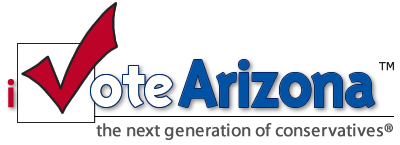
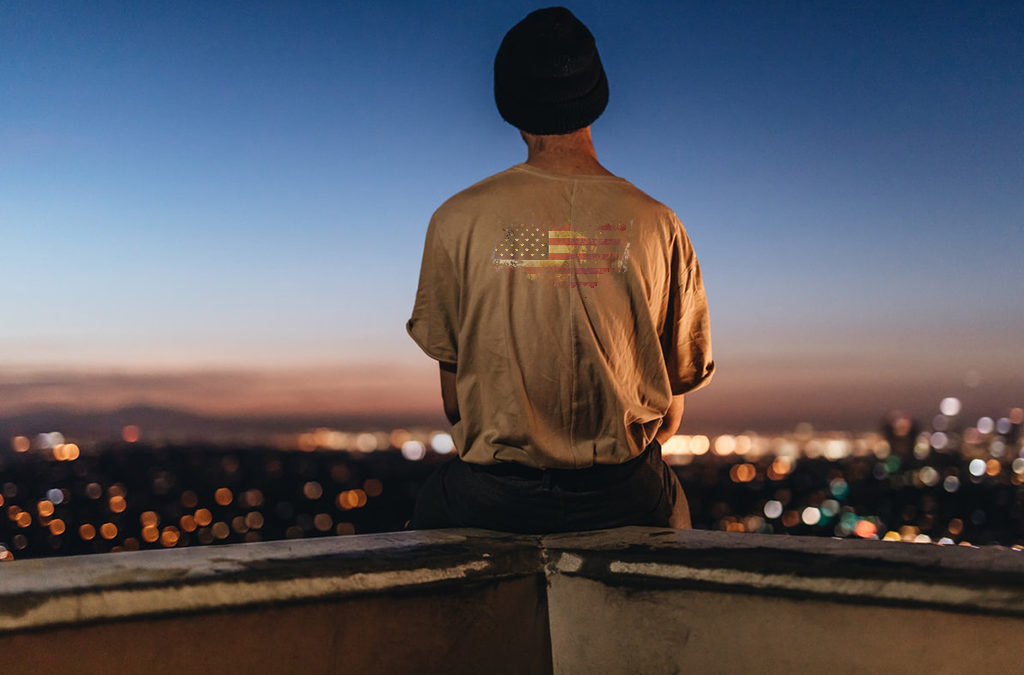




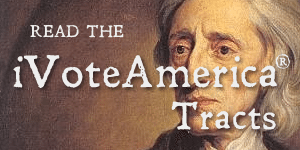
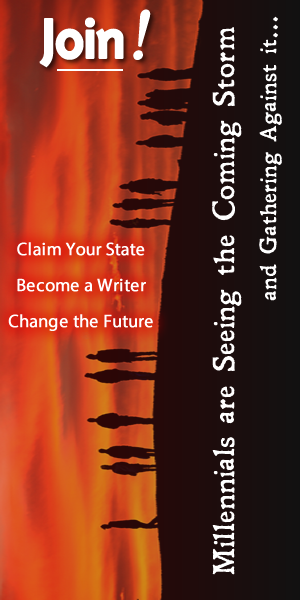
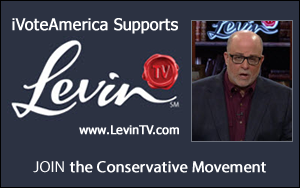
If you're happy with BIG Government, then ignore this!
Good Choice...Let's Get Rid of Big Government